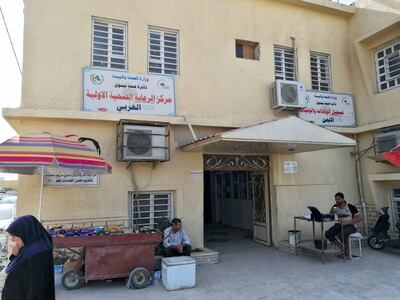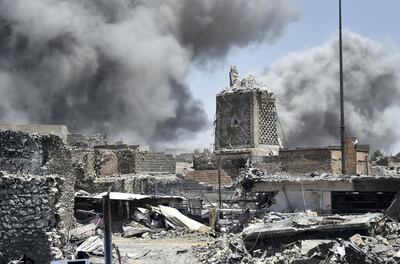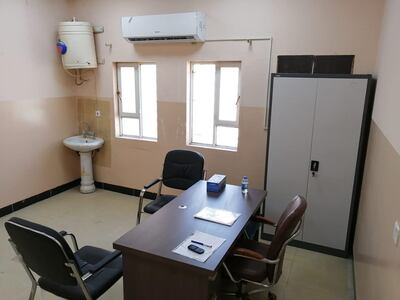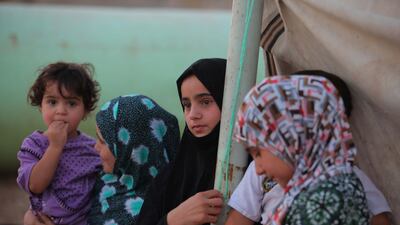Ibrahim says he no longer trusts anyone.
The 30-year-old from Mosul suffers from trauma after years of fighting when ISIS controlled the city from 2014 to 2016.
The terrorist group killed his younger brother, the person he says he was closest to, during their occupation of the city.
Although Ibrahim knew who had killed his brother, he felt helpless and unable to avenge his killing. A few months later, his father died. While the city was under ISIS rule, he says he witnessed daily traumas, including mass killings, which made life unbearable.
Today, two years after ISIS was pushed out of the northern Iraqi city, Ibrahim has trouble sleeping. He suffers from nightmares and flashbacks.
He says he is sad and irritable most of the time, it’s impacting his social life and capacity to work.
Ibrahim is quick to become aggressive and finds it hard to control his anger. He says his simply exhausted all the time and he can barely take care of himself.
Iraq is a country all too familiar with conflict. Disappearances, kidnappings, unexplained arrests and violence have been all too common for decades, first under former dictator Saddam Hussein and then in the chaos after the 2003 US-led invasion.
There are thousands of men like Ibrahim in Iraq who desperately need access to mental health support, experts say. But most won’t come forward.
“Generally, people [in Iraq] have little knowledge of mental health, so there is a strong stigma surrounding mental health conditions, and a common idea that ‘only crazy people’ need mental health support,” says Ahmed Hussein, a psychologist and health field officer for International Committee of the Red Cross.
"This requires raising awareness on what is mental health and how to take care of one's mental health," Mr Hussein, who works with the ICRC's Mental Health and Psychosocial Support (MHPSS) programme in Iraq, told The National.

The ICRC started the Mosul programme in October 2018 as a pilot project in Hammam Al Alil, a town south of Mosul where ISIS carried out a massacre of 300 residents in 2016. The scheme has also expanded to work in the Al Gharbi health centre in the Bab Jdeed neighbourhood close to Mosul’s Old Town.
There are now five health professionals, including nurses, working at the medical centres. But due to staff shortages, they have had to train nurses who are not mental health specialists.
Since the beginning of this year, 205 people have benefited from mental health counselling sessions and 368 people have benefited from awareness sessions in the two ICRC-supported health centres.
Mr Hussein says that the number of new patients coming to the centres is growing, as the cultural stigma around mental health reduces and people spread the word about the services around their local communities. In the first quarter of this year, there were just 58 people seeking treatment. In the second quarter, there were 70 and by the third it had risen to 77.
Mr Hussein says that due to this lack of awareness around mental health, people tend to go to see a doctor to treat specific conditions such as depression or insomnia, rather than seeking a psychologist to help treat the causes.
“In the Iraqi society, people rely heavily on the use of drugs for treatment. The first thing that patients ask us when they come for a consultation is, ‘do you have drugs?’,” Mr Hussein says.
“Men have a tendency not to speak about their concerns or what is worrying them, because they are expected by their community to bear responsibilities and stay strong, and someone who would request mental health support would be considered as having a weak personality.”
While research shows many mental health conditions affect men and women in near equal measure, just over 90 per cent of those attending the ICRC-supported health centres in Mosul are women, Mr Hussein says.
Although the stigma affects women too, it appears to have a more marked effect on mens’ approach to mental health and stops them from seeking help, he says.
Maryam, 25, is also getting help at one of the ICRC programme’s centres. She has eight siblings, her mother was a housewife and her father was a soldier in the Iraqi army.
Despite having a happy childhood, her life took a dark turn in 2005. Her mother was kidnapped by militants and nearly 15 years later she still doesn’t know where she is or whether she is alive.

When ISIS took control of Mosul, Maryam says her situation worsened.
While her family were trying to cross the Tigris River to flee the town, one of her brothers fell into the water and drowned. She too remembers the killings, the kidnappings, the random arrests and the bombings.
Psychologists have diagnosed her as suffering from Post-Traumatic Stress Disorder (PTSD) from her experiences.
She still suffers the symptoms, including flashes of heightened anxiety, she’s become withdrawn and feels an emotional numbness.
The impact wasn’t only mental, but physical and included breathing difficulties, muscle tension and increased heart palpitations.
Maryam says she still doesn’t sleep well. She has recurring nightmares about the events she lived through and has a permanent feeling of insecurity.
Her PTSD was compounded by the breakdown in her relationship.
"I feel extremely sad. I'm so tired psychologically," she tells The National. "My relationship with my husband was bad, he was cheating on me and physically abusing me, he was addicted to alcohol. So eventually I got divorced, but they took my son from me, the father and his family do not allow me to see my son."
After the divorce, Maryam went back to live with her father and brothers. But they too beat her and emotionally manipulated her, dismissing her PTSD.
“I lost everything, my son, my brother, our house has been completely destroyed during the war against ISIS. The life we’re living is nothing more than hell,” she said.
The symptoms of her PTSD compounded with the seemingly never ending feeling of negativity, she said, led her to contemplate suicide.
Most of the patients that visit health centres in Mosul are suffering from similar symptoms of anxiety, depression or a combination of the two. Trouble sleeping is common.
“They have lived traumatic experiences, they’ve seen torture, they’ve witnessed people being killed or slaughtered in front of them,” says Hussein, adding that all patients suffered from the psychological effects of war.
He says the cases are complex but the main cause is clear.
“There are multiple factors to these mental health conditions, but in most cases they are related to the effects of war and violent events that took place in the area,” he says. “Most of the people we see have a missing or detained family member, or a family member killed during the conflict against the ISIS. Many of them have at least one family member who went missing.”

Although awareness about treatment options may be starting to increase, an understanding and commitment to the treatment process – as well as having enough trained staff – continue to be issues.
“Another difficulty we face is the lack of commitment of the patients to regular consultations, and to have to deal with very severe and difficult cases with a non-specialised staff in the [clinics],” says Hussein.
But the awareness sessions to explain to communities that there are services to help are encouraging more people to come forward and talk, he explains. Mr Hussein adds that he’s seeing more people come without being referred by a doctor.
ICRC is now planning to expand the services in the region of Mosul. The two centres where the organisation runs its mental health programme see up to 21 patients a week, but the ICRC is training nine additional staff so that it can attend to more patients. After the training, it will be able to have at least two members of staff in each of the following Primary Health Care Centres in Mosul and around Mosul: Al-Gharbi, Imam al-Gharbi and Qasr el-Sireej in the city of Tal Afar. The other three trained staff will be used as back-up in case any of the others drop out.
Despite a lack of trained staff and a whole community that has lived through traumatic experiences, Mr Hussein and his colleagues say they hope to spread awareness so people are comfortable coming forward and getting the support they need.
*names have been changed to protect identities

